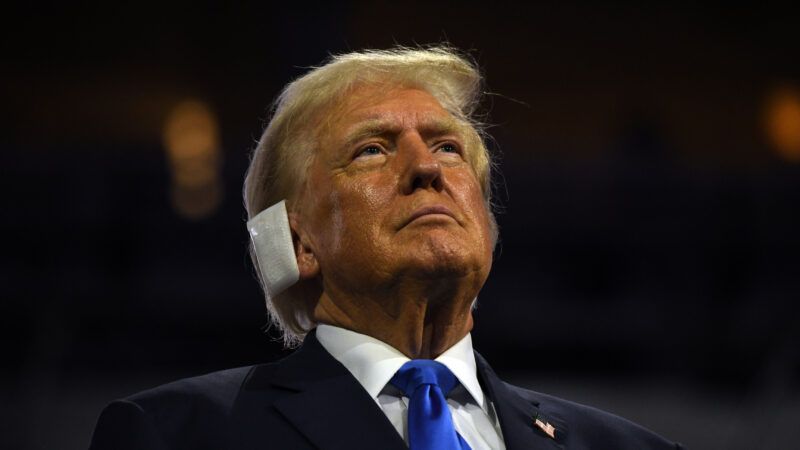Trump Changes His Mind on Zoning. Again.
Whoever is president has very weak incentives to get zoning reform right.

Former President Donald Trump has had one of his periodic changes of heart. In a recently published interview with Bloomberg, he called zoning regulations he'd spent most of 2020 campaigning in favor of "a killer" that's pushing up housing costs.
"So 50% of the housing costs today and in certain areas like, you know, a lot of these crazy places is environmental, is bookkeeping, is all of those restrictions," Trump said in an interview conducted in June and published yesterday. "Your permitting process. Your zoning, if—and I went through years of zoning. Zoning is like…it's a killer. But we'll be doing that, and we'll be bringing the price of housing down."
As America's first developer president, Trump has more experience with zoning regulations than perhaps any other occupant of the White House—except maybe Herbert Hoover.
He knows more than most public officials that minimum lot sizes, height limits, setbacks, use restrictions, and innumerable other zoning restrictions can make life very difficult for people just trying to build things.
His comments to Bloomberg are welcome. They're also a remarkable about-face. Trump spent his last run for the White House campaigning as the nation's NIMBY in chief.
"A once-unthinkable agenda, a relentless push for more high-density housing in single-family residential neighborhoods, has become the mainstream goal of the left," wrote Trump and his then-Housing and Urban Development (HUD) Secretary Ben Carson in an August 2020 Wall Street Journal op-ed, specifically criticizing policies in Oregon, Minneapolis, and California that allowed smaller, multi-unit developments in formerly single-family only neighborhoods.
"We will save our cities, from which these terrible policies have come, and we will save our suburbs," Carson and Trump concluded. In follow-up tweets, Trump promised to save the "American suburban lifestyle dream."
People might recall that Trump's pro-zoning campaign messaging in 2020 was itself an abrupt reversal of his administration's own policies.
Up through mid-2020, Trump's HUD under Carson had been revamping federal fair housing rules to encourage more local deregulation. They'd proposed rewarding HUD grantees with the possibility of additional funds and regulatory relief if the grantees could show they were permitting lots of housing and becoming more affordable for it.
"I want to encourage the development of mixed-income multifamily dwellings all over the place," Carson told The Wall Street Journal in 2018. "I would incentivize people who really would like to get a nice juicy government grant" to reform their zoning codes.
Those plans were then abruptly scrapped in July 2020 in favor of a new set of fair housing rules that attached basically no strings to the receipt of federal housing funds.
It's always a bad instinct to yell at people when they are agreeing with you about something, even if they've been wrong about that same thing in the past. On the other hand, it's prudent to question how committed someone is to a position when they flip-flop so drastically on it.
President Joe Biden's administration, in contrast, has been rhetorically consistent about the need for liberalizing changes to local zoning codes that will allow for more development.
The trouble with the current White House is that their policies in this regard don't live up to their consistently stated rhetoric.
Time and again, the Biden administration has said they would use a handful of discretionary federal housing and transportation grant programs to incentivize zoning reform. Time and again, those same grant programs award money to jurisdictions that either haven't liberalized their zoning codes, have made their zoning codes more restrictive, or don't set zoning policy.
Both Trump and Biden's disappointing policies on zoning reform show that the federal government is not the place to look for progress on this issue.
The fact is, even with the power of the purse, the federal government can only play a limited role in getting local and state governments to deregulate land use. Tweaks to fair housing regulations or discretionary grant programs can help to move state and local policy in a positive direction, but they can move it only so far.
Even if an administration gets those tweaks just right, the positive real-world impacts on housing costs will be modest, as will any political goodwill it receives for it.
In that context, other political incentives are going to weigh more heavily.
For Trump, the chance to score points with NIMBYs on the campaign trail won out over wonky fixes to a fair housing rule few voters had heard of. For all the positive rhetoric, it's clear that the Biden administration puts more value on awarding grant money to political allies than incentivizing productive local reforms.
We shouldn't expect these incentives to change much in whichever administration occupies the White House next.
Rent Free is a weekly newsletter from Christian Britschgi on urbanism and the fight for less regulation, more housing, more property rights, and more freedom in America's cities.


Show Comments (47)